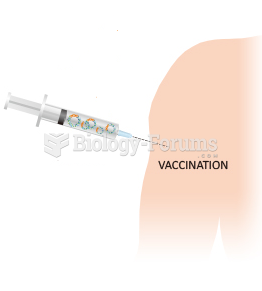|
|
|
Though Candida and Aspergillus species are the most common fungal pathogens causing invasive fungal disease in the immunocompromised, infections due to previously uncommon hyaline and dematiaceous filamentous fungi are occurring more often today. Rare fungal infections, once accurately diagnosed, may require surgical debridement, immunotherapy, and newer antifungals used singly or in combination with older antifungals, on a case-by-case basis.
Bacteria have been found alive in a lake buried one half mile under ice in Antarctica.
When intravenous medications are involved in adverse drug events, their harmful effects may occur more rapidly, and be more severe than errors with oral medications. This is due to the direct administration into the bloodstream.
After 5 years of being diagnosed with rheumatoid arthritis, one every three patients will no longer be able to work.
Green tea is able to stop the scent of garlic or onion from causing bad breath.







